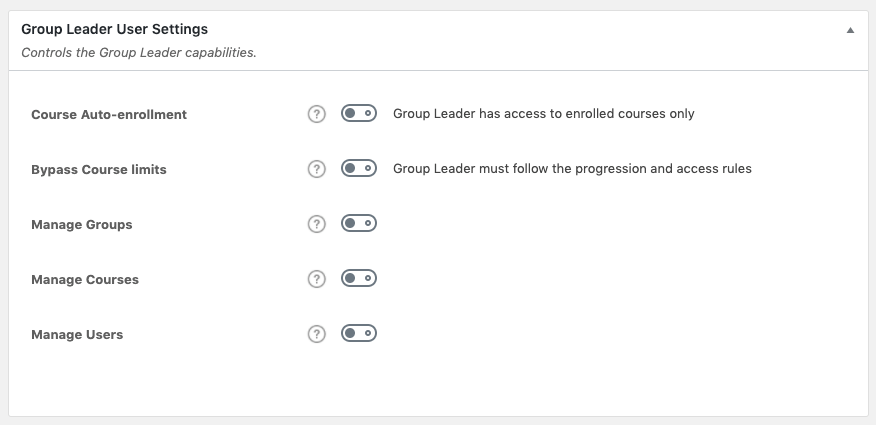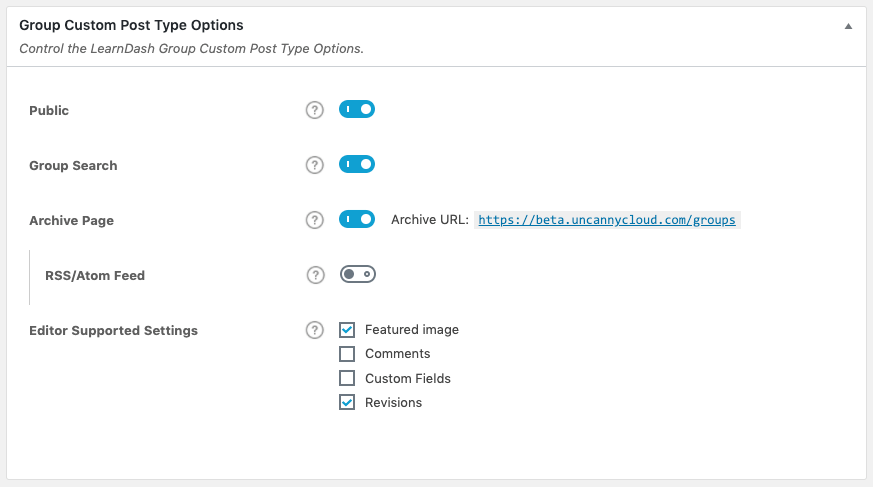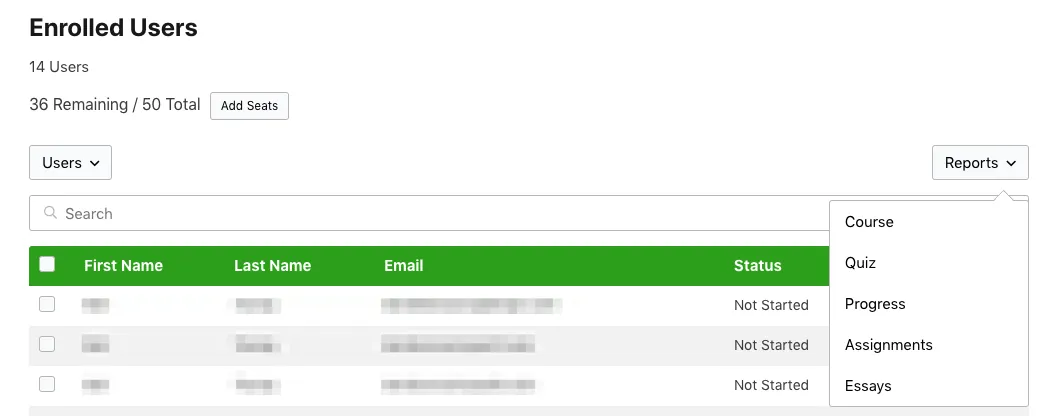LearnDash 3.2 and Group Changes
The LearnDash LMS plugin for WordPress first introduced groups almost 7 years ago, back in version 1.4. Groups were a way to assign courses and track progress for a collection of students as a single unit. It also empowered a new type of user, called a Group Leader, to oversee the activity for that segment of users rather than for all students on a site.
As one of the most popular features in LearnDash, site owners started wanting more and more group capabilities. They extended group options with membership plugins, and developers like Uncanny Owl and Wisdm Labs built plugins specifically to add more features to LearnDash Groups.
The LearnDash 3.2 release is the most significant change to the groups model since LearnDash first added them in 2013. In this article, we’ll examine what’s different and how it affects users of third party group and membership plugins.
Here are some of the high-level additions in 3.2 for LearnDash Groups:
- Group purchases
- Group hierarchies
- Group certificates
- Group pages
- Group content protection
- Group user management
- Bypass course restrictions for Group Leaders
- Course creation and management for Group Leaders
- Group creation and management by Group Leaders
- A new ld_group_list shortcode
- Search restrictions based on course enrollment
Group purchases
LearnDash 3.2 now supports selling access to groups, so that on purchase of a product/group, the purchaser is added to the associated group. LearnDash supports this natively as well as via their WooCommerce LearnDash integration plugin (version 1.8 or higher is required). This is a great feature that makes it easier for sites to offer a paid way for students to self-enroll into groups.
Along with this change, LearnDash Groups now adopt some some of the Access Mode options that you would normally associate with Groups. Three Group Access Modes are now supported:
- Free (users with an account can add themselves to a group)
- Buy Now (purchases enabled via LearnDash payments)
- Recurring (purchases via LearnDash payments)
- Closed (payment using an integration, third party plugin or admin intervention; “Closed” is what groups in previous versions would have been considered and is the default)
Uncanny Owl notes
While LearnDash now supports this in the core plugin, this capability has existed in third party plugins for several years. Our Uncanny Groups plugin supports it, Uncanny Automator supports it, and the Wisdm Labs Group Registration plugin supports it. The new LearnDash capability is also for selling group access to individual users; it doesn’t yet support sales to organizations (so that organizations can create groups and manage them in the front end). For that, a third party plugin (like Uncanny Groups) is still required.
Group hierarchies
One of our #1 requests for our Groups plugin has been to have it support group hierarchies. We held off because we preferred to see support for this come from LearnDash, and now that it’s here, we’re excited about the possibilities. What this feature does is allow users to optionally add child groups to parent groups. Users added to a parent group are automatically added to the child groups and get access to anything in the subgroup(s). On the opposite side, users can still be in child groups and then don’t inherit anything from parent groups.
Uncanny Owl notes
This has been a highly-requested feature, but the requests are usually for reporting roll-ups (so reports at the parent level include child group data) and pools of seats/licenses set at the parent level that can be allocated to subgroups. That’s not quite what this is, but we may still see movement in those directions (from both LearnDash and Uncanny Owl if we see interest for them; a way to enable these do at least exist in LearnDash now).
Group pages
In LearnDash 3.2, groups are now about more than just assigning course access and reporting, they also provide new opportunities to organize courses and offer group-specific content in the front end. By making group pages public and using a new shortcode that outputs a list of group pages a student has access to, it’s now easier than ever for elearning site owners to organize courses around groups and to deliver specific information and course content to members of a group.
Uncanny Owl notes
It’s been possible for a long time to offer group-specific content to users based on CRM tag, membership level, and even group access. In our plugins we offer the Restrict Page Access module in Toolkit Pro to control access at the group level to specific pages/posts, and many other plugins offer similar tools. Where the new LearnDash capability makes things easier is by providing access to group pages themselves along with a shortcode that outputs links to those pages. With other tools, including ours, it wasn’t always clear how to make restricted access pages easy to find.
Group content protection
Beyond the new access restrictions for Group pages, LearnDash now supports restricting any page, post, or other post type based on a user’s membership in groups. Once this is enabled, each associated post type will have an option to restrict the post to members of specified groups only.
Uncanny Owl notes
Post-level restrictions based on group are supported in the Restrict Page Access module in Toolkit Pro, but they can also done with other plugins like WP Fusion using tag-based restrictions linked to LearnDash Group. In the case of both of those, they add the ability to redirect users that don’t have access rather than just display messaging on the restricted page. Both WP Fusion and our Uncanny Groups plugin offer other group-based restrictions too, like shortcodes to restrict specific content on a page to certain groups.
Course creation
Starting with LearnDash 3.2, Group Leaders can now create and manage courses. Depending on settings, this can include the Group Leader’s own courses only or all courses on the site. Course creation works exactly as it does for admins, in the back end (i.e. /wp-admin/) and with the same available tools. Note that some third party tools normally only available to admins and other expected WordPress roles (and role capabilities) may not necessarily be available in editors.
Uncanny Owl notes
The Wisdm Labs Instructor Role plugin has historically served a similar purpose and continues to offer many advantages, like front end course creation and commission options for instructors. The new native features in LearnDash are likely to appeal to organizations where internal staff are creating courses, so they need a restricted role for course creation and management and are comfortable with course creation in the back end, whereas the Wisdm Labs plugin is likely to appeal more to sites where the course creators are third parties and may have less WordPress experience.
Group certificates
This new certificate type offers the option of awarding certificates for the completion of a group of courses. If all courses assigned to a group are completed by a student, a downloadable certificate is added to the group page for the user. It’s a nice way of being able to award specific certificates for completing a series of courses without having to set up workarounds like course prerequisites.
Uncanny Owl notes
Our Continuing Education Credits plugin has offered certificates based on the completion of a series of courses for several years. Where the LearnDash approach differs is with convenience and easy on-site retrieval of the certificates from the new group page. Our plugin also had the drawback of not recognizing completions of courses that were done before the plugin was installed. Toolkit Pro users: Yes, we do expect to add support for emailing out group certificates (like we do for course and quiz certificates) in an upcoming release.
User management
This new optional feature (and we do want to stress that it’s optional, as we’ve heard from a few nervous upgraders) now puts many elements of user management in the hands of Group Leaders. This is a feature where we suggest a lot of caution and testing, as it does mean that Group Leaders can create, edit and delete users. The basic setting gives Group Leaders access to only the users in their groups, while the advanced setting gives Group Leaders access to any user on the entire site. We expect this will be used primarily on sites where Group Leaders are internal staff, because the ability to delete users and change information about them can be risky and recovery can be difficult. Still, for sites where Group Leaders can be trusted and need these types of tools, this is a great addition.
Uncanny Owl notes
The front end Group Management features in our Uncanny Groups plugin have allowed some level of user oversight and management for some time, but we’ve been very reluctant to put this level of control in Group Leader hands. We won’t even allow Group Leaders to set passwords for existing users, because the Group Leaders could potentially then access personal user data with the password, including data from other courses and personal information. If your staff need this type of control the LearnDash features will be a great addition; we still don’t plan to add anything like this to our plugins because of our concerns around privacy and destruction of data without an audit trail.
Group management
This next optional setting allows Group Leaders to create, manage and delete groups from inside /wp-admin/. Depending on the setting, this can apply to all groups on a website or only groups for which the user is a Group Leader.
Uncanny Owl notes
This can be another great option when Group Leaders need a lot of control and are likely employed by the site owner. The difficulty of recovering from group deletions and management of groups created by Group Leaders without consent of site admins remain a concern for us though. We can think of a few organizations we’ve worked with where these tools would be very helpful, but there still aren’t many. Our Uncanny Groups plugin does offer front end group creation, but we don’t enable it by default and we always emphasize caution (and restricting access) when people inquire about it.
Bypass course limits
Group Leaders can now optionally navigate anywhere they want in a course and ignore the Linear rules, just like admins can. This is a great addition that we plan to enable on most sites we support for ease of use and reduced confusion by Group Leaders.
Course auto-enrollment
When enabled, Group Leaders get access to courses assigned to groups for which they’re Group Leaders. This makes it easier for Group Leaders to see and review the courses that their students are completing.
Uncanny Owl notes
Our Toolkit Pro plugin has offered similar functionality for several years in the Improved Group Leader Interface module. As mentioned after the LearnDash 3.0 release, however, we largely now consider that module a legacy module and no longer as useful as it once was, especially with this new change in LearnDash core. Our Uncanny Groups plugin also offers a way for Group Leaders to get course access for the groups that they manage.
The ld_group_list shortcode
Paired with the Course Grid add-on from LearnDash, this new shortcode adds a new way to see groups visually. With this tool, courses can be organized by group, effectively another level in the LearnDash course hierarchy. Groups might even be used as categories to allow easier organization of related courses.
Search restrictions
We haven’t seen as much discussion around this feature, but LearnDash 3.2 now only returns lessons, topics and quiz results in WordPress search results if the user is enrolled in them. This means students will see fewer irrelevant search results and won’t experience frustration when they click into posts only to be told that they don’t have permission to view them.
Uncanny Owl notes
This is a huge improvement, and we have actually built custom solutions for some clients that have this exact behaviour. For those consulting clients we’re glad we could provide solutions where otherwise none existed, but now that LearnDash core supports this, it’s the better path forward.
We will note that this new behaviour will only work effectively if permissions are managed based on LearnDash course enrollment. For sites that make all of their courses Open and then restrict individual access by membership level, CRM tag or other intervention, this new LearnDash enhancement won’t make a difference.
Wrapping up and other notes
LearnDash 3.2 is a huge release and the LearnDash team deserve a lot of congratulations for the work they’ve done. They have taken big steps to make groups more useful and solve problems around membership capabilities for many current and future LearnDash users. It’s a big release, so there are a few outstanding issues as we publish this (there were also big changes to the TCPDF libraries and we expect a 3.2.1 release soon), but overall LearnDash 3.2 is going to open up many new course delivery and management capabilities for elearning site owners.











This is exciting, especially for group hierarchies! When can we expect Tin Canny Reporting to show us nested groups?
We are probably still 1-2 weeks away for leveraging some of the hierarchy capabilities in our plugins. It’s coming though!